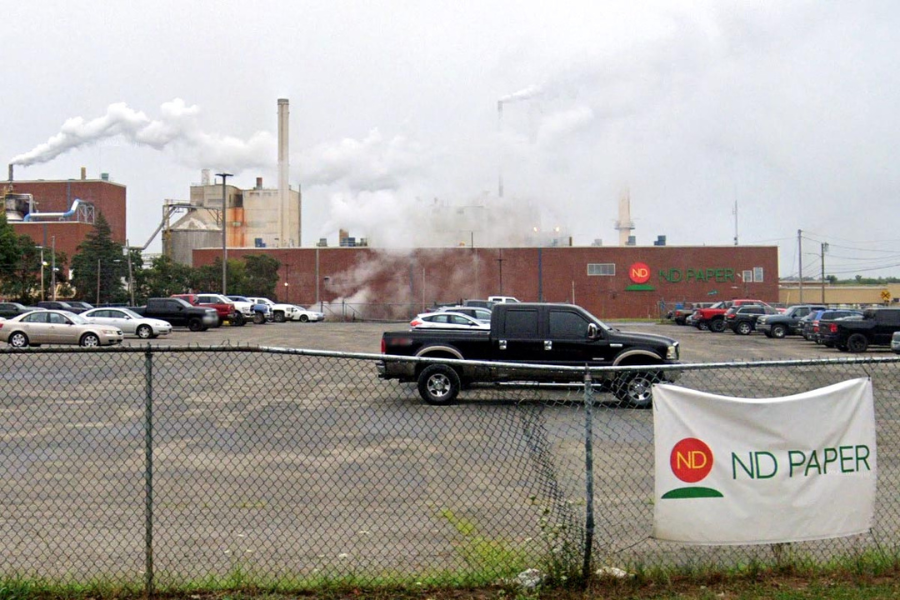
Nine Dragons has issued a “profit warning” to investors, informing them to expect a loss for the second half of 2022. | Courtesy of ND Paper
Citing difficult market conditions, paper product manufacturer ND Paper is temporarily halting or reducing production at some of its U.S. locations that consume recycled feedstock.
ND Paper, which is owned by Chinese paper giant Nine Dragons, is taking “extended downtime” at its mill in Old Town, Maine due to the rising costs of fiber and energy, as well as general market conditions, said Jay Capron, ND Paper’s director of communications and government affairs.
Additionally, ND Paper “will significantly reduce” market pulp production at its Fairmont, W.Va. mill because of market conditions, Capron told Resource Recycling.
“We will continually evaluate market conditions for a potential restart,” he said.
Meanwhile, the company is making significant investments at its Biron, Wis. mill, allowing the plant to boost its post-consumer fiber recycling capacity, he noted.
Difficult market conditions
ND Paper first bought up its U.S. mill about five years ago. In 2018, shortly after China’s National Sword campaign took effect, Nine Dragons purchased mills in Biron, Wis.; Rumford, Maine; and Old Town, Maine. At the time of purchasing, those three mills specialized in producing paper products from virgin pulp. But after buying them, ND Paper invested hundreds of millions of dollars so those mills could recycle post-consumer fiber, including OCC and mixed paper.
Also in 2018, Nine Dragons acquired a Fairmont, W.Va. mill, which produces recycled pulp for use in various products.
ND Paper also owns a plant in Sturtevant, Wis., where paper is converted into corrugated boxes and other finished products.
One of Nine Dragons’ strategies with the U.S. investments was to produce recycled pulp for export to China for conversion into products. Chinese authorities haven’t banned imports of recycled pulp like they have various other scrap bale grades.
Market conditions appear to be squeezing Nine Dragons on both input costs and product prices.
Megan Workman, editor and price reporter at market data company RISI, reported on LinkedIn that recycled brown pulp prices have taken a dive lately. According to Workman, mills are reporting high inventories but lackluster demand in the Chinese packaging market.
In February, Nine Dragons issued a “profit warning” to investors, alerting them to expect the company to report a loss for the latter half of 2022, the first time the company has reported a loss since 2006. The alert cited COVID-19’s impact on the Chinese market, inflation caused by the war in Ukraine, and the selling price for products decreasing “substantially” while the input costs and sales volume remained relatively stable.
“In response to the extremely weak market demand, the Group had to suspend production for destocking and offer sales discount for promotion during the Period,” Nine Dragons’ chairlady, Cheung Yan, wrote in the full 2022-23 financial report, which also mentioned the falling value of China’s currency and higher interest rates.
In the U.S., the Old Town, Maine location sitting idle, in particular, has garnered local media attention.
OCC pulping line coming on-line soon
Meanwhile, Capron provided an update on upgrades at the Biron, Wis. mill.
He noted that the mill just last week finished converting one of its machines from producing lightweight, coated publication papers to producing recycled brown packaging grades. The project was first announced a year ago.
“This means that our Biron mill is now solely producing brown packaging grades,” he said.
That plant already had a second machine converting pulp derived from OCC into recycled corrugated medium and linerboard for packaging.
Additionally, ND Paper is preparing to bring online another OCC pulping line in Biron, with a grand opening scheduled for May 18. The line will start with a production rate of about 1,200 metric tons per day, ramping up to over 2,000 metric tons daily, he said.
The mill also has an OCC pulping line that it installed in 2019, shortly after it bought the facility. That first one produces about 700 metric tons of pulp per day, Capron said.
A company spokesperson previously told Resource Recycling that all of the recycled pulp produced by the new OCC pulping system will also be consumed by the mill.